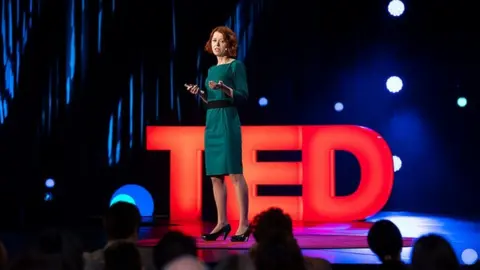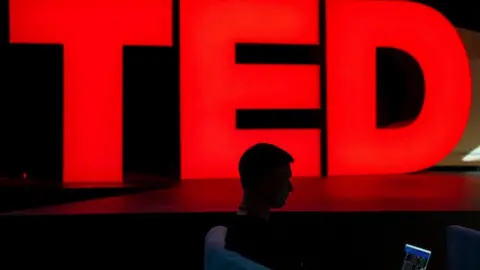TED 2018: Ukrainian journalist fights fake news
 Jason Redmond/TED
Jason Redmond/TEDA powerful talk about the need to do more to counter fake news has opened the TED (Technology, Entertainment and Design) 2018 conference in Vancouver.
Journalist Olga Yurkova described a false story in which the Ukrainian army had supposedly "crucified" a three-year-old child.
The story, reported by Russian state media, came from a woman claiming to be a refugee.
"The only problem was that the story was not true," explained Ms Yurkova.
That - and stories like it - led her to co-found StopFake, a fact-checking website set up to counter Russian propaganda in Ukraine.
The refugee, Galyna Pyshnyak, was in fact the wife of a pro-Russian militant.
The crucifixion never happened and even the location of the event was made up.
"The story claimed that the army had rounded up the locals in Lenin Square in the city of Seovyansk, but that square did not exist."
The story not only fooled a lot of people in both Ukraine and Russia but also led directly to people "taking up arms", Ms Yurkova claimed.
She told the TED audience that fake news represented a threat "to democracy and society".
"Ukraine has been subject to Russian propaganda for four years and now fake news is happening all over the world," she told the TED audience.
"People no longer know what is real and what is fake and a lot of people have stopped believing anything at all. This is even more dangerous."
StopFake was launched in 2014, specifically to deal with fake news in Ukraine.
It has since evolved into a sophisticated fact-checking organisation covering media sources in 11 languages.
To date, it has revealed more than 1,000 misleading news items in Ukraine and taught more than 10,000 people how to spot similar stories around the world.
Ms Yurkova offered some simple advice for anyone worried about how to distinguish fact from fiction.
"If the story is too emotional, too dramatic, it is likely it is not true. The truth is often boring," she said.
"Do your research, look at other sites. Google names and addresses. Society depends on trust and it is up to all of us to find a way to rebuild it."
Russian interference
The issue of fake news has become a talking point since it emerged that Russian bot accounts - many of which have been traced to the Internet Research Agency in St Petersburg - had planted fake stories online.
In February, 13 Russians were charged with interfering in the US 2016 election, including individuals based at the Internet Research Agency.
But how much influence the activity had on the 2016 presidential campaign remains open to debate.
A new study from researchers at Ohio State university suggests that fake news played a significant role in the changing voters' minds about voting for Hillary Clinton in that election.
The study, which has not been peer-reviewed, suggests that about 4% of those who voted for Donald Trump may have been dissuaded from voting for Clinton because of fake news stories about her.
Those included stories that suggested she was in very poor health, others claiming that Pope Francis was endorsing Trump, and ones suggesting that Clinton had approved the sales of weapons to Islamic jihadists.
Meanwhile, a Princeton-led study of fake news consumption during the election found that false articles made up 2.6% of all hard-news articles.
Russian journalist Mikhail Zygar, who also spoke at TED, said that the Russian influence had been "over-stated" in the West.
"I have no doubt that it was the American people who elected Donald Trump," he said.
"Russian hackers wanted to create chaos but they didn't understand the consequences of that chaos and the scale of that operation is exaggerated."
Spreading ideas
 Jason Redmond/TED
Jason Redmond/TEDTED's annual conference in Vancouver - this year titled The Age of Amazement - will feature more than 100 talks, interviews, demos and performances over five days.
Speakers share ideas in a series of short talks lasting from three to 18 minutes.
"Both as a media platform and an annual conference, we strive to be a voice of sanity, reason and insight in today's increasingly polarised dynamic of outrage," said the head of TED, Chris Anderson.
"Our theme - The Age of Amazement - is an attempt to compellingly plunge in to the good and the bad of what lies ahead for humanity," he added.
